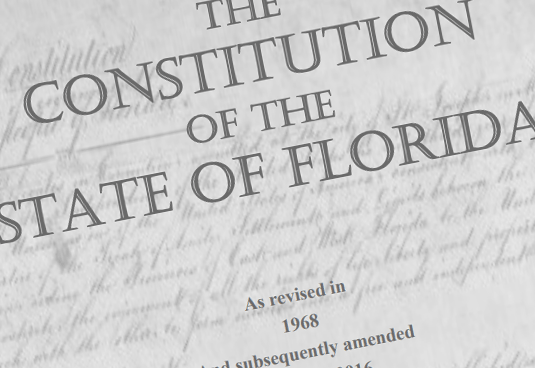
How we lost the right to partisan school board elections blog article was made possible by the SeminoleGOP
Learn about the Seminole County Florida Republican Party Platform
How we lost the right to partisan school board elections
By Barbara Haiss Martin
A joint resolution (HJR-31) to restore partisan elections of school board members passed both the House and Senate and heads to the Secretary of State’s office to be placed on the 2024 ballot as an amendment to the Constitution. If the amendment passes with a 60 percent vote, it would take effect at the next general election in 2026. The vote in both the House and Senate was along party lines with Republicans voting for the measure and Democrats voting against it.
All four Seminole County State Representatives Doug Bankson, Rachel Plakon, Susan Plasencia, and David Smith voted for the House Resolution. Seminole’s State Senator Jason Brodeur voted for the Senate version of the resolution.
So how was this right to elect school board members in partisan elections lost?
Early Florida Constitutions apparently left the education election details up to the counties. In Seminole County, according to Sanford Herald news articles and editorials from 1914 through 1997, the county switched back and forth between partisan and non-partisan elections depending upon who was in office. But having Republicans in office didn’t necessarily guarantee a partisan vote for school board members. Seminole voted in partisan elections through a 15-member Charter Review Commission after voters had voted for a new Charter Government in 1993.
Tallahassee had its own review commission. A Florida Constitutional Revision Commission (CRC) was voted in by electors (about 1958) and was tasked to meet every 20 years and propose changes to the Constitution. Those changes were Amendments placed directly on the next ballot to be voted on by the public. The process bypassed any work or review of Legislators.
Florida’s previous Constitutions had revision clauses that allowed legislators to refer a Constitutional Amendment to the ballot, to accept valid citizen initiatives, and to call for a Constitutional Convention.
The first CRC met in 1977 and placed eight constitutional amendments on the 1978 ballot. All were rejected by the voters.
Twenty years later in 1997 when the second Florida Constitutional Revision Commission met, eight of the nine amendments placed on the 1998 election passed including one for non-partisan school board elections. It took effect in the 2000 election.
Fifteen of the 37 unelected CRC commissioners in 1997 were appointed by Gov. Lawton Chiles (D); nine by President of the Senate Toni Jennings (R); nine by Speaker of the House Daniel Webster (R); three by Chief Justice of the Florida Supreme Court Gerald Kogan (D) and Gov. Chiles appointed the Chairman.
So the last time we lost the right to vote in fair partisan elections for school board members, was when Republicans controlled both the House and the Senate. However, the Governor appointed 19 of the 37 commissioners to give the Democrats a one-vote advantage.
At least twice since the creation of the CRC, the legislature attempted to abolish it through a ballot amendment, but, so far, each time the voters have rejected it. It meets again in 2037.
Since the joint resolution has made it to the ballot, now the real work begins to educate Republicans and Independents before the election.
Democrats, of course, have always favored non-partisan elections since it gives them an advantage. They traditionally work in lockstep and just put up one candidate. Since Republicans are more freedom-minded, whomever wants to run for office, runs. Last election, Republicans had several well-qualified candidates with two or three each running against the one Democrat in each of three school board races. All three Democrats won outright or in a run-off election a month later.
School Board elections are listed on primaries, not general elections. Because they are non-partisan, there are no primaries for them.
Since the next school board election will be held in 2024 prior to passage of the Amendment, one solution for Republicans is to have their own private, in-house primary and select one candidate (in each race) to run against the whomever the Democrats put up for the school board seats. This would eliminate the Democrats’ advantage as well as preventing a Democrat-funded Republican from winning the race as nearly happened in the last school board race.
Thanks for reading the article written by Republican Barbara Martin on “How we lost the right to partisan school board elections” Remember to follow us on Facebook!
Barbara Haiss Martin is an award-winning journalist who has lived in Seminole County with her husband, John, since 1972.